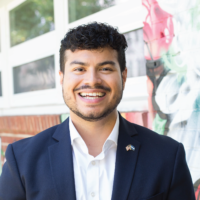July 17, 2024
Status of Key Policies that Promote Health Equity and Needed Progress (Session 2024 Recap)
Policy decisions have a significant impact on our ability to access affordable and comprehensive health coverage, connect with a health worker who shares similar lived experiences, access relevant services that are readily available in times of need, and take paid time off of work to care for ourselves or a loved one. The 2024 General Assembly session was a pivotal opportunity for legislators to consider bills and budget amendments that could make a significant difference for health equity in Virginia. The results were mixed, with lawmakers choosing to invest in some critical health care areas while missing opportunities to get other needed proposals across the finish line.
Cover All Kids
Access to comprehensive health coverage is critical for people of all ages. That is certainly the case for children ages 0 to 18, who experience numerous physical and developmental milestones during this period. Health coverage during these critical years is proven to have key health-related benefits, such as lowering hospitalization and emergency department use in adulthood and better health outcomes throughout a person’s lifespan. Medicaid health coverage for children has been proven to increase academic outcomes, college enrollment, and future employment for those enrolled.
Unfortunately, access to health coverage can vary depending on a child’s immigration status. Children in Virginia who are U.S. citizens have an uninsured rate of 3.8%, compared to 48% for undocumented children living in Virginia. Undocumented children are currently barred from accessing Medicaid, FAMIS (Virginia’s CHIP Program), and Affordable Care Act health coverage.
The General Assembly considered proposals (HB970, Del. Tran; SB231, Sen. Hashmi) to create a health coverage program available to roughly 13,000 children from low-income families regardless of immigration status during this legislative session, which would help more children access coverage at a rate closer to their peers who are citizens. The House Health and Human Services Committee advanced the House proposal for the first time in three attempts over three years, but it was not passed by the House Appropriations Committee. The full Senate passed its proposal and included funding to start the program in the Senate budget proposal for the second consecutive year. The Senate proposal then crossed over to the House, meeting the same fate as the House proposal: the House Appropriations Committee did not advance the bill.

Community Health Workers (CHW)
Connecting with a medical professional with similar life experiences or who speaks your preferred language can make a big difference in how you communicate and build relationships with a medical provider. Community Health Workers (CHWs) are front-line public health workers who can help bridge the connection between medical providers and community members. CHWs are often a knowledgeable and trusted resource for community members who may have difficulty creating a natural connection to health systems. Language barriers and distrust of medical systems due to a history of medical experimentation on communities of color, such as the infamous Tuskegee Study and similar U.S.-led experiments in Guatemala, have led to deep mistrust in many communities. Community health workers can be a vital resource to encourage better communication and earn back that trust.
As of July 2023, there were 112 CHWs employed at 25 of Virginia’s 35 health districts. Unfortunately, the end of federal grant funding meant Virginia was set to lose about 60 CHWs employed at local health districts by July 1, 2024, and more than 25 additional workers would follow in the year after that unless state lawmakers acted. Thankfully, lawmakers approved a budget amendment to provide an additional $6.4 million to backfill the federal grant funding, meaning more people in Virginia can connect and stay connected to critical health services provided by their local health districts.
Paid Family and Medical Leave (PFML)
For many, paid time off from work is essential to utilizing health coverage and appropriate services. Going unpaid for an extended period or facing the possibility of losing your job can often act as a barrier to those who need to take time off to take care for themselves or a loved one.
National data suggests that paid family and medical leave is hard to access for many, particularly for people of color: While 54% of non-Hispanic white workers had access to some form of PFML in 2017-2018, access was significantly lower among Asian American (46%), Black (42%), and Hispanic (31%) workers. People who are paid less than $15 an hour have less access to both paid and unpaid leave than their higher-paid counterparts, are more likely to report job loss or fear of job loss as a result of taking leave, and are more likely to borrow money or need public assistance to cover lost wages.
Proposals considered in 2024 (HB737, Del. Sewell; SB373, Sen. Boysko) to establish a state-level paid family and medical leave (PFML) program would have reduced the financial and stress-related burdens of taking time off to care. The legislation was amended several times during the session. Ultimately, a proposal to fund and create a program that guarantees 8 weeks of paid time off for most Virginia workers — exempting local officers, state employees, and public school employees — was passed by the General Assembly and corresponding funding was included in the General Assembly’s approved budget. Eligible workers could have expected 80% of their average weekly wage, not to exceed 80% of the regional weekly wage during their time off.
Unfortunately, Governor Youngkin vetoed the legislation and funding for the program was contingent on the passage of SB373. The final budget did include $250,000, which is dedicated to further studying the program and determining the fiscal impacts of including workers exempted from the 2024 proposal.
Looking Forward
Although progress was made during the 2024 legislative session, we hope the General Assembly will take another look at proposals to Cover All Kids and ensure paid time off to care for more working people across Virginia. Our Virginia neighbors, coworkers, and family members are counting on our governor and state legislators to continue investing in health equity. TCI will continue to educate lawmakers and join with community leaders to advance these life-changing policies.
Categories:
Budget & Revenue, Health Care
